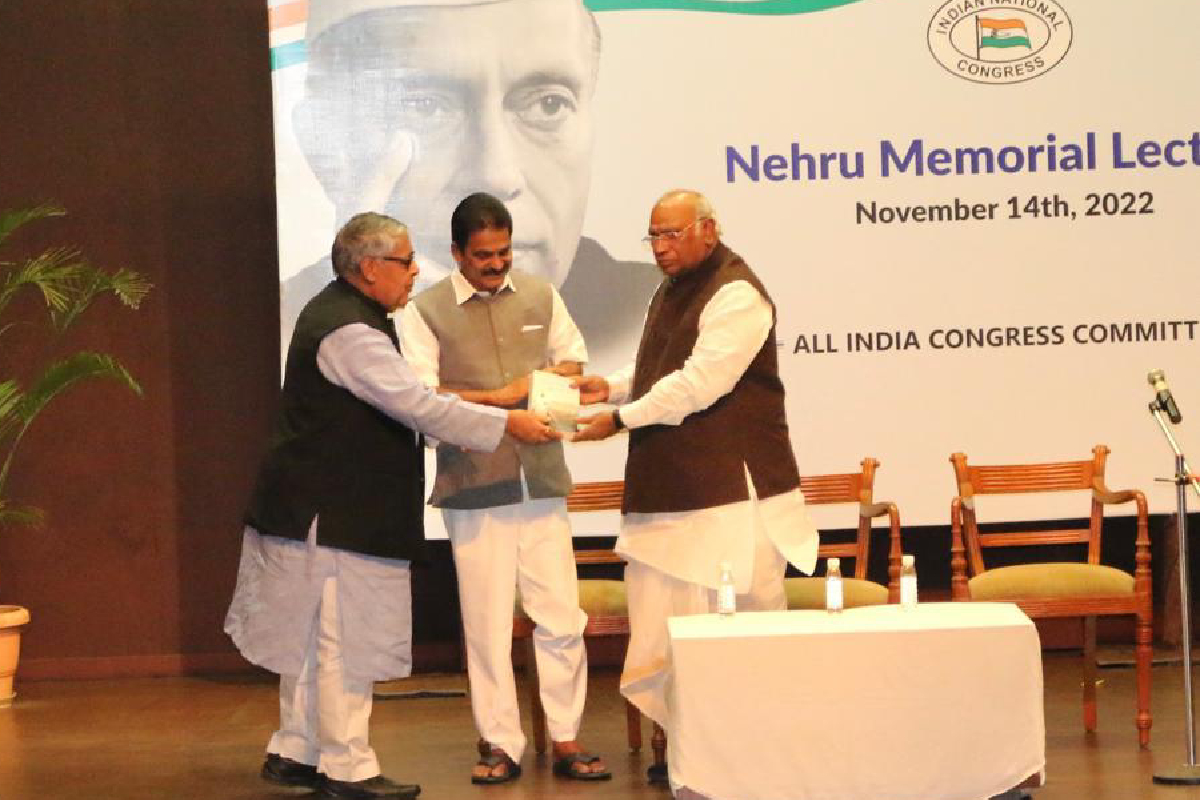On the 133rd birth anniversary of independent India’s first Prime Minister Pandit Jawaharlal Nehru, Congress president Mallikarjun Kharge on Monday accused the Bharatiya Janata Party (BJP)-led centre of following a policy of “changing names”, instead of focusing on work.
He also slammed the government, saying that it is “not a democratic one” and is following a policy of “divide and rule”.
The newly appointed Congress chief made the remarks while speaking at the Nehru Memorial Lecture that was delivered by leading academic Purushottam Agrawal at the Jawahar Bhawan here.
Charging the government, the Rajya Sabha MP said that earlier, the Nehru Memorial Lecture used to happen at Teen Murti Bhavan, where Nehru’s views and ideas were put forward. He went on to say that the government is no longer allowing anyone to present Nehru’s ideas.
Taking a potshot at Prime minister Narendra Modi, Kharge said, “The Prime Minister asks on several occasions what happened in the country in the last 70 years? But the answer lies in the figures for life expectancy, the economy, irrigation projects, and dams. Their (BJP’s) work is to divide and rule, and that is why Rahul Gandhi has undertaken the Bharat Jodo Yatra.”
The veteran leader also slammed the government over the issue of unemployment and pointed out that, according to the answers given by the Centre in Parliament, there are about 30 lakh vacancies in the central government-aided institutions and schools, while PM Modi has distributed only 75,000 appointment letters.
Kharge also took a dig at the government for changing the name of the Planning Commission to Niti Aahog and asked, “There is no ‘niti’ so what is the ‘aayog’ for?” “They believe in changing names. Do some work and then change names,” he alleged.
Kharge also slammed PM Modi for lying to the people of Karnataka, claiming that when he was railway minister, he started a train service from Mysuru to Varanasi. “Now Modiji claimed credit for starting a new train service between Bengaluru to Varanasi during his visit to Karnataka recently,” he said, referring to the flagging off the Gaurav Bharat Bengaluru-Kashi train service.
Kharge also accused the BJP of trying to appropriate Sardar Vallabhbhai Patel, who was a staunch Congressman. He asked the ruling party to adopt the principles of Patel.
Meanwhile, Agarwal also slammed Union Law Minister Kiren Rijiju and said that nobody is beyond criticism.
“Nehru was, and his admirers are, confident enough to take criticism. The point, however, is the departure from criticism. A democracy can be criticised for not being democratic enough and also for being too democratic, as was done by some during the recent kisan agitation.”
He said that one can also be concerned about democracy being deliberately turned into majoritarianism, as all of us ought to be at the present moment.
Citing the handling of the Kashmir issue, Agarwal said, “On the Nehru government’s handling of Kashmir, one can talk in great detail about it, but presently just one question – if his handling was so wrong, why have none of his illustrious colleagues resigned from his cabinet? Why Dr Shyama Prasad Mukherjee not resign in protest?”
Agarwal said that debates will and must go on, and there is no need to copy Nehru’s policies. “No need to act like a ‘vedia’. The point is about the basic orientation. Was it in the right direction? Was it in the interest of Bharat Mata, i.e., the people of India?” he said.
Agarwal also said that these days, some people under the influence of the neo-liberal worldview claim that Nehru’s vision is only a thing of the past, and his foreign policy is described as disconnected from the national interest.
“Many lament the fact that India did not join the US camp after independence. In the economic sphere, Nehru is accused of subsidising unproductive behaviour, regulating incompetence, and distributing poverty,” Agarwal said.
“If all this is true, then, of course, Nehru is only historically important, but not relevant for the present and future. But is this true?” he questioned.
He also said that the average Indian life expectancy in 1947 was 31 years, and after 17 years of ‘distributing poverty’ in 1964, it went to around 50! “Was it a mean achievement? That too going along with a robust democracy in which the critics of the Prime minister were not denounced as anti-nationals and the Prime Minister did not describe abuses as his staple diet,” he said.
He also said that the Nehruvian idea of the economy was “holistic” and that health and education were considered the state’s duty and “not a burden.”
Agarwal went on to say that while Nehru’s foreign policy has been criticized, and even condemned by some, it has stood the test of time.
“As Nehru wrote after his Discovery of India, it was not India’s destiny to be an insignificant follower of any camp, India was destined to play a major role in the world. Given this fate and the circumstances, non-alignment was not only the best but the only option,” he emphasized.
He stated that, in contrast to the intellectual laziness of jumping on this or that bandwagon, putting the “Indian approach” into practice demonstrated creativity and courage.
“Wisely and fortunately, so far, the Indian governments have followed Nehruvian foreign policy in spirit, even when the world is no longer bi-polar,” Agarwal said.
“It is in the same spirit that India is working in tandem with the emerging large economies like Brazil, China and South Africa. One hopes that despite all the Nehru bashing so dear to the current regime, this spirit will continue,” Agarwal said.
Earlier in the day, Kharge, former party chief Sonia Gandhi and several other leaders paid floral tributes to Nehru in Delhi.









